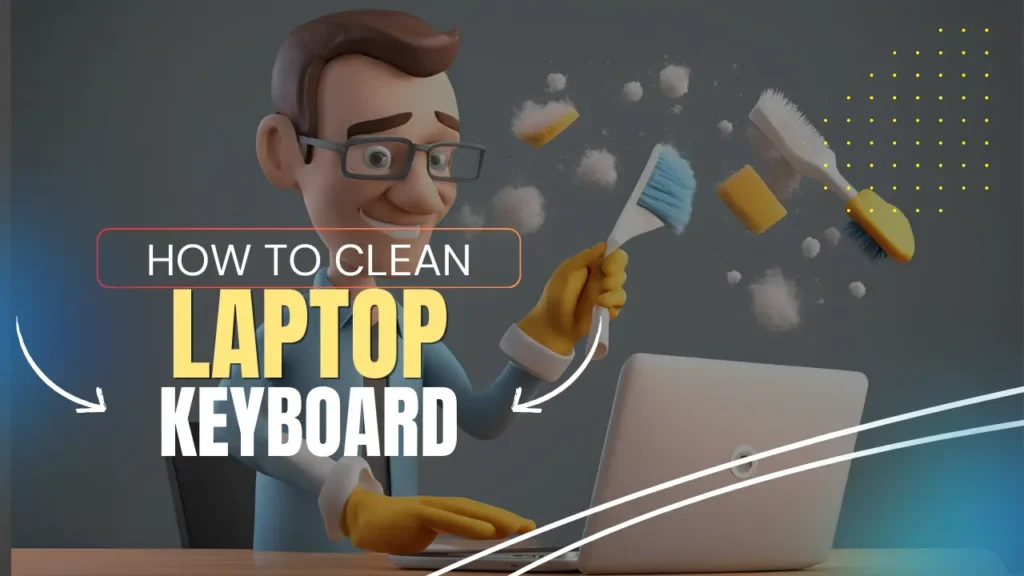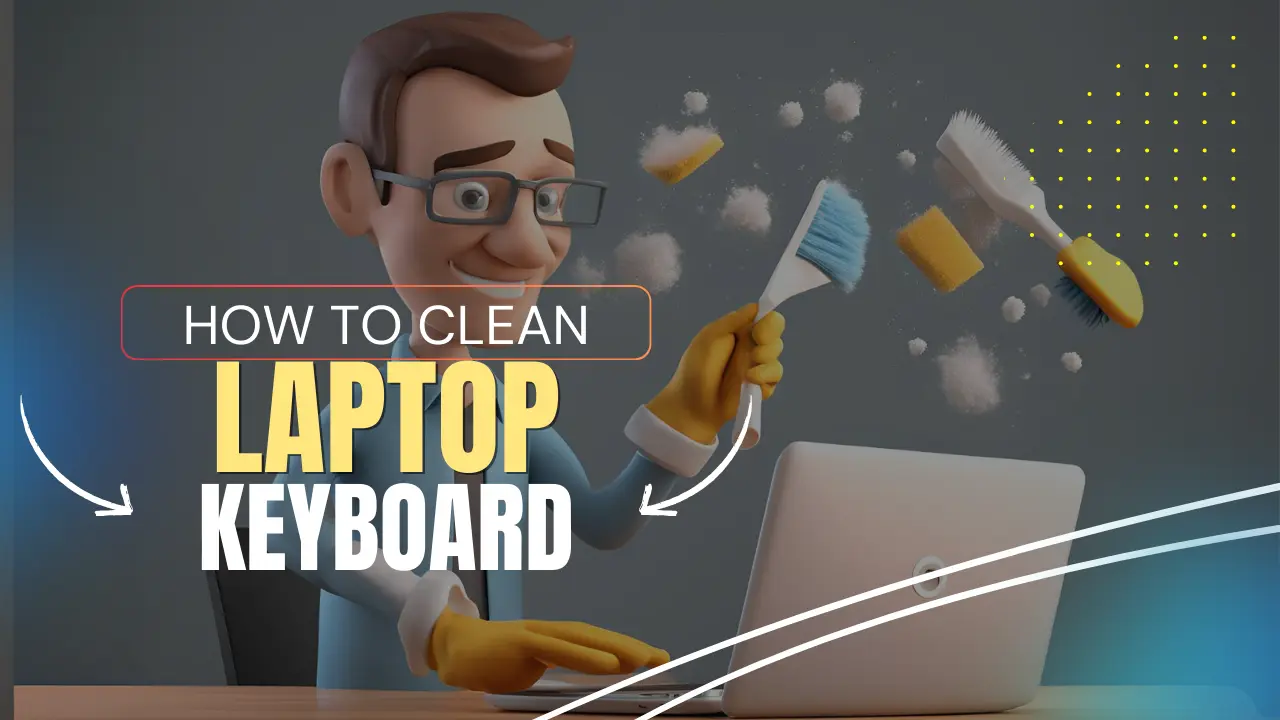Introduction: Why Cleaning Your Laptop Keyboard is Essential
The Amma Two Wheeler Scheme is an excellent initiative supporting mobility, but just like maintaining a two-wheeler, caring for your laptop keyboard is equally crucial. Learning how to clean a laptop keyboard safely ensures your device stays functional and hygienic. Dust, dirt, and sticky residue not only affect its performance but also shorten its lifespan. This step-by-step guide to safely clean a laptop keyboard without damage will walk you through effective cleaning techniques and precautions to keep your device in pristine condition.
Why Is Cleaning a Laptop Keyboard So Important?
Your laptop keyboard is one of the most frequently used components of your device. Over time, it accumulates dust, dirt, and germs, which can lead to serious problems. Knowing how to clean a laptop keyboard safely is essential not only to maintain its performance but also to ensure hygiene. This article highlights why regular cleaning is crucial and how it benefits your device and overall health.
1. Preventing Keyboard Malfunctions
Dust and dirt can get trapped under the keys, causing them to stick or become unresponsive. This can make typing frustrating and inefficient. By learning how to clean dust and dirt from under laptop keys safely, you can prevent malfunctions and keep your keyboard working smoothly.
2. Prolonging Your Laptop’s Lifespan
A neglected keyboard can cause long-term damage to your laptop. Sticky residues, spilled liquids, and accumulated debris can seep into internal components, leading to costly repairs or replacements. Following a step-by-step guide to safely clean a laptop keyboard without damage ensures the longevity of your device.
3. Ensuring Hygiene and Reducing Health Risks
Your keyboard is a hotspot for bacteria and germs, especially if you eat or work at your desk. These germs can transfer to your hands and potentially cause illnesses. Using the safest way to disinfect a laptop keyboard at home regularly keeps your workspace clean and reduces health risks.
4. Enhancing Typing Experience
A clean keyboard feels better to use. Removing sticky keys with the best methods to clean sticky keys on a laptop keyboard safely enhances the typing experience and improves productivity.
5. Avoiding Expensive Repairs
Cleaning your keyboard is a simple task that can save you money in the long run. By adopting DIY techniques for cleaning a laptop keyboard without breaking it, you can avoid the high costs of professional cleaning or part replacements.
Step-by-Step Guide to Safely Clean a Laptop Keyboard Without Damage

1. Preparing for the Cleaning Process
Before diving into cleaning, preparation is crucial:
- Power off and unplug the laptop. This step ensures safety and avoids short circuits during the cleaning process.
- Gather necessary supplies:
- A microfiber cloth
- Isopropyl alcohol (70% or higher)
- Cotton swabs
- Compressed air canister
- A soft brush
Proper preparation is the foundation of learning how to clean dust and dirt from under laptop keys safely.
2. How to Clean Dust and Dirt from Under Laptop Keys Safely
Dust particles are the most common issue affecting laptop keyboards. Here’s how to address them:
- Blow out dust using compressed air.
Hold the canister at a slight angle to dislodge dirt effectively without pushing it deeper. - Brush the surface.
Use a soft-bristled brush to sweep away dust from hard-to-reach areas. - Tilt the laptop.
Tilt the device slightly while cleaning to let debris fall out naturally.
These methods ensure minimal risk while thoroughly removing debris.
3. Best Methods to Clean Sticky Keys on a Laptop Keyboard Safely
Sticky keys can make typing an ordeal. Here’s a reliable way to handle them:
- Dip a cotton swab in isopropyl alcohol.
Ensure the swab is damp but not dripping. - Gently clean around the sticky key.
Focus on the edges where residue tends to accumulate. - Wipe the surface.
Use a lint-free cloth to dry the area and remove leftover grime.
Following this process ensures sticky keys function like new without risking damage.
4. Safest Way to Disinfect a Laptop Keyboard at Home
Keeping your keyboard germ-free is essential, especially in shared workspaces.
- Dampen a microfiber cloth with isopropyl alcohol.
Avoid water, which can seep into the keyboard. - Wipe each key carefully.
Cover the entire surface, focusing on high-contact keys. - Air dry completely before use.
Disinfecting your keyboard is a key aspect of maintaining its cleanliness and ensuring safe usage.
5. DIY Techniques for Cleaning a Laptop Keyboard Without Breaking It
For more intensive cleaning, follow these DIY steps:
- Remove keys cautiously.
Some laptop models allow key removal for better access underneath. Check your user manual first. - Use a soft toothbrush or small brush.
Sweep away stubborn grime from under the keys. - Avoid harsh chemicals.
Stick to isopropyl alcohol and avoid household cleaners that may damage components.
Tips for Preventing Future Build-Up
Preventing dirt and debris from accumulating on your laptop keyboard is just as important as knowing how to clean a laptop keyboard safely. By adopting simple habits and practical precautions, you can reduce the frequency of deep cleaning while maintaining a hygienic and functional keyboard. These tips align with DIY techniques for cleaning a laptop keyboard without breaking it, ensuring your device stays in pristine condition for longer.
1. Use a Keyboard Cover
A keyboard cover acts as a protective barrier against dust, crumbs, and spills. This inexpensive accessory is one of the best methods to clean sticky keys on a laptop keyboard safely because it minimizes exposure to contaminants in the first place.
2. Avoid Eating and Drinking Near Your Laptop
Food particles and liquid spills are the leading causes of sticky and damaged keys. Make it a habit to keep snacks and beverages away from your keyboard. This practice helps you avoid the hassle of learning how to clean dust and dirt from under laptop keys safely due to preventable messes.
3. Schedule Regular Quick Cleanings
Quick weekly cleanings can go a long way in preventing dirt build-up. Use a soft brush or compressed air to remove dust before it becomes a bigger problem. Regular maintenance supports the safest way to disinfect a laptop keyboard at home, keeping your device hygienic and functional.
4. Wash Your Hands Before Typing
Your hands can transfer oils, dirt, and germs to your keyboard. Washing your hands before using your laptop reduces residue and minimizes the need for frequent cleaning. This simple habit contributes to DIY techniques for cleaning a laptop keyboard without breaking it.
5. Store Your Laptop Properly
When not in use, store your laptop in a clean, dust-free environment. Consider using a laptop sleeve or case for added protection. Proper storage helps reduce exposure to contaminants, ensuring that you rarely need to follow a step-by-step guide to safely clean a laptop keyboard without damage.
6. Clean Around Your Workspace
A dusty or cluttered workspace increases the chances of debris finding its way onto your keyboard. Regularly clean your desk and surroundings to maintain a clean working environment, which supports the principles of how to clean a laptop keyboard safely.
Also Read: How to Recover Deleted Files from a PC: 7 Life-Saving Hacks You Need to Know!
FAQs: How to Clean a Laptop Keyboard Safely
Properly cleaning your laptop keyboard is essential to maintain its functionality and hygiene. Here are frequently asked questions (FAQs) about how to clean a laptop keyboard safely, integrating primary and secondary keywords naturally.
1. How often should I clean my laptop keyboard?
It’s recommended to clean your laptop keyboard weekly to remove surface dirt and dust. For deeper cleaning, you can schedule a more thorough session monthly. Regular cleaning ensures optimal performance and hygiene, especially when learning DIY techniques for cleaning a laptop keyboard without breaking it.
2. What tools are needed for safe keyboard cleaning?
You will need a microfiber cloth, isopropyl alcohol, compressed air, cotton swabs, and a soft brush. These tools are part of the best methods to clean sticky keys on a laptop keyboard safely and to remove dust and debris without causing damage.
3. Can I use water to clean my laptop keyboard?
No, water is not safe for cleaning electronics. Instead, use isopropyl alcohol (70% or higher) as it evaporates quickly and minimizes the risk of liquid damage. This is particularly important when learning how to clean dust and dirt from under laptop keys safely.
4. What should I do if liquid spills on my keyboard?
Turn off your laptop immediately, unplug it, and tilt it to drain the liquid. Use a lint-free cloth to dry the surface and allow the laptop to air dry completely before powering it on. For severe spills, consider professional assistance. This step aligns with the safest way to disinfect a laptop keyboard at home after accidental spills.
5. Can I remove laptop keys for cleaning?
Yes, but only if your laptop model allows for key removal. Check the user manual for guidance. Removing keys can help in DIY techniques for cleaning a laptop keyboard without breaking it, but improper handling may cause damage.
6. How can I prevent dirt and dust from accumulating on my keyboard?
To minimize dirt and dust:
- Cover your keyboard when not in use.
- Avoid eating or drinking near your laptop.
- Regularly use compressed air to blow out particles.
These preventive measures align with how to clean a laptop keyboard safely, reducing the need for frequent deep cleaning.
7. Is it safe to disinfect a keyboard with household cleaners?
No, household cleaners may damage your keyboard. Stick to isopropyl alcohol for disinfection, which is part of the safest way to disinfect a laptop keyboard at home.
8. What should I do if sticky keys remain unresponsive after cleaning?
If sticky keys persist, try cleaning them again with isopropyl alcohol and a cotton swab. If the issue continues, consult a professional technician for repairs. This process ensures you’re following the best methods to clean sticky keys on a laptop keyboard safely.
9. Can I use a vacuum cleaner to remove dust from my keyboard?
While a vacuum cleaner might seem effective, it can generate static electricity, which could harm your laptop. Instead, use compressed air and a soft brush, as these are safer alternatives when learning how to clean dust and dirt from under laptop keys safely.
10. Are there specific cleaning tips for mechanical keyboards?
Yes, mechanical keyboards often allow for easier key removal, making it simpler to clean under the keys. Follow DIY techniques for cleaning a laptop keyboard without breaking it by removing keys carefully and using a soft brush for thorough cleaning.
